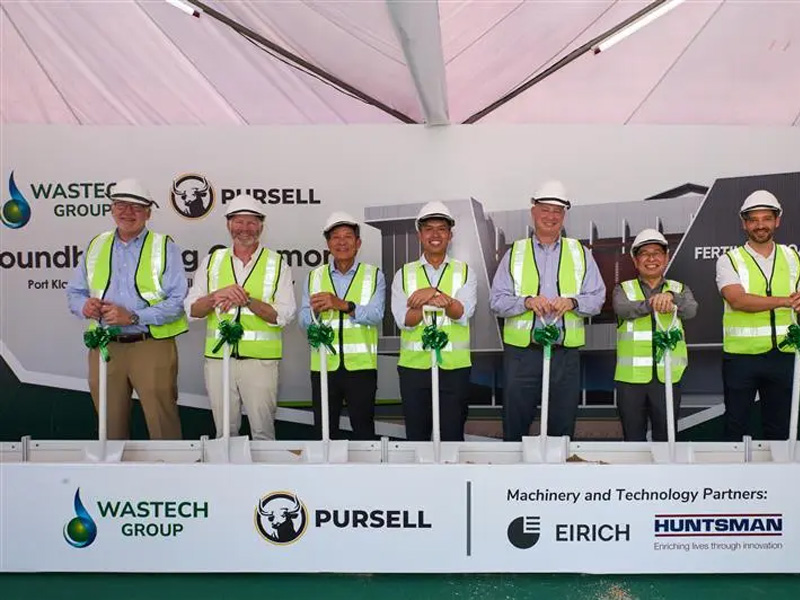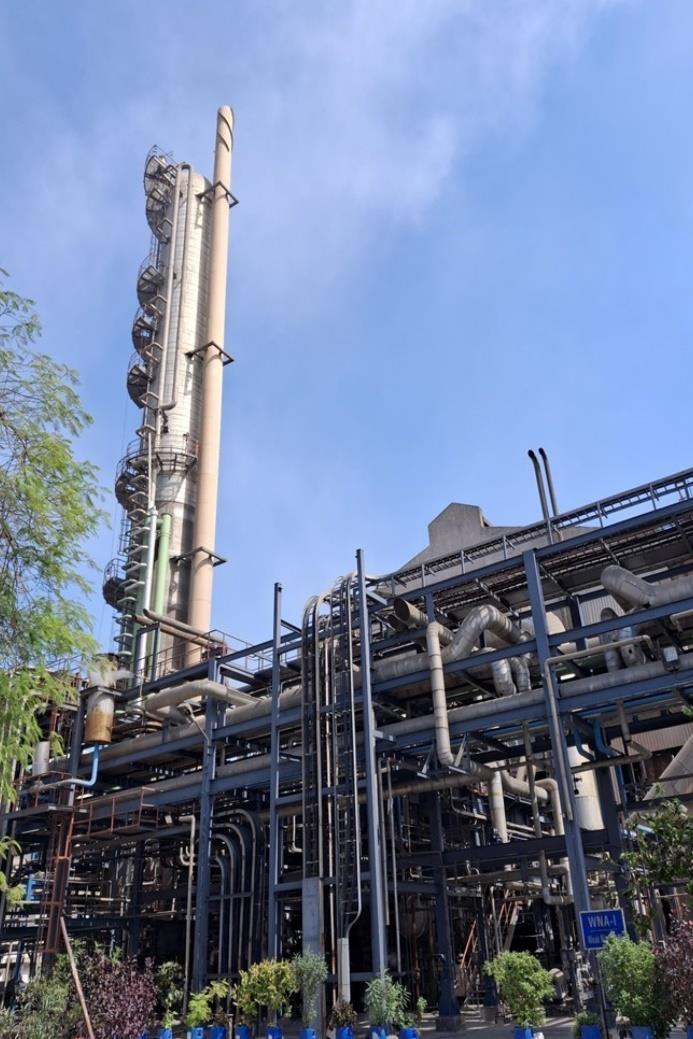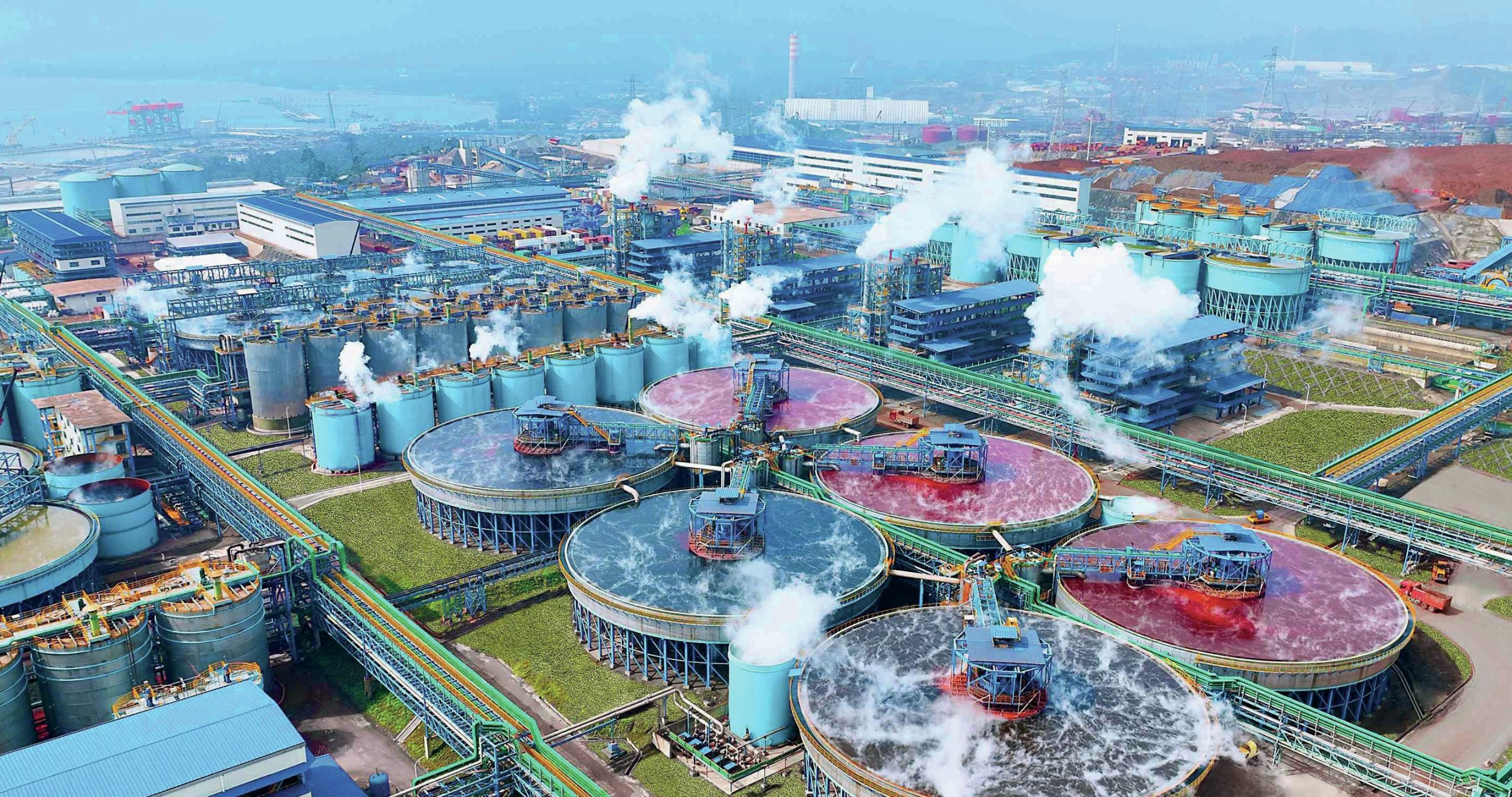Sulphur 395 Jul-Aug 2021
31 July 2021
Sulphur Industry News Roundup
UNITED ARAB EMIRATES
Saipem wins contract expand Shah sour gas plant
The Abu Dhabi National Oil Company (ADNOC) has awarded a $510 million engineering, procurement and construction (EPC) contract to Italy’s Saipem to expand production capacity at the Shah sour gas plant, as the UAE looks to increase its output of gas by 2030. The Optimum Shah Gas Expansion (OSGE) & Gas Gathering project has been awarded by ADNOC Sour Gas, a joint venture between ADNOC and US energy major Occidental. The contract will increase gas processing capacity at the Shah plant by 13% per cent to 1.45 bcf/d from 1.28 bcf/d by 2023 and supports ADNOC’s objective of enabling gas self-sufficiency for the UAE. The Shah gas plant currently meets 12% of the UAE’s total supply of natural gas, as well as producing 5% of the world’s elemental sulphur. The expansion will cumulatively represent a 45% increase on the plant’s original capacity of 1.0 bcf/d when it came on-stream in 2015.
“Shah’s expansion will optimise the plant as well as improve both capacity and higher-end product recoveries, further growing our contribution as a safe and reliable supplier of gas to ADNOC and the UAE,” said Tayba Al Hashemi, chief executive at ADNOC Sour Gas.
The scope of the development work at the Shah gas plant includes engineering, procurement, construction, pre-commissioning, commissioning, and start-up of facilities to increase plant production capacity. Saipem will also extend the existing gas gathering network and new pad facilities, as well as all associated off-sites and utilities needed to integrate the new facilities with existing installations.
Gulf chemical industry “requires bold leadership”
Securing a bright future for the GCC’s chemical industry will require bold leadership that adapts to the new trends emerging in the post-pandemic reality, said speakers at the inaugural edition of the Gulf Petrochemicals & Chemicals Association (GPCA) Leaders Forum. Delivering the inaugural address at the forum, Yousef Al-Benyan, chairman of the GPCA and vice chairman and CEO of SABIC, said that industry leaders would need to change how they think about growth, innovation and operating models. He highlighted a major acceleration – during the pandemic – of already established trends such as digitalisation, a re-energised focus on sustainability and innovation, the circular economy, the move towards decarbonisation and renewable energy, as well as the energy and materials transition among others. The pandemic emphasised the power of collaboration, without which the world would not be anywhere near a global recovery, he remarked. The industry’s challenge now shifts to building a new ecosystem that allows us to thrive in the long run, Al-Benyan added, expressing his confidence in the industry’s ability to emerge even stronger from this period of change.
Buoyed by a gradual economic recovery within the region and its largest export market, China, the GCC chemical industry believes that it is well positioned for longterm growth. Real growth in the GCC region is expected to be at 2.5% between 20212023, while China is targeting 6% growth in 2021. This may be a welcome development but comes with its own challenges, as the Asian country accelerates its move towards self-sufficiency in chemicals which will reduce demand for imports from the GCC region.
Dr. Abdulwahab Al-Sadoun, Secretary General of the GPCA, added, “Chemical industry leaders must leverage the lessons learned from the COVID-19 pandemic and lead with a renewed sense of purpose to create value for its shareholders, costumers, society and our planet. The next decade will require companies to embrace people centricity, innovate and adopt agile decision making. To succeed, the industry would also need to drive customer collaboration and formulate effective partnerships. It would need to develop products that meet the future needs of our times and demonstrate leadership in the digital transformation.”
ISRAEL
Siwertell to deliver sulphur unloader for Ashdod
Bruks Siwertell has signed a contract with Ashdod Port Company Ltd for the delivery of a Siwertell ST 490-M screw-type ship unloader destined to serve Ashdod, Israel’s largest seaport in terms of cargo volumes. The new Siwertell ship unloader has been ordered as part of the port’s major expansion plans. It will be rail-mounted and used to discharge sulphur and petcoke at continuous rated capacities of 600 t/h and 500 t/h respectively from vessels up to 60,000 dwt.
A fundamental requirement of the port was environmental protection. Although a valuable and widely used commodity, it is now environmentally unacceptable for sulphur to be spilled during unloading. However, its containment increases the build up of sulphur dust ‘hot spots’, creating the potential to explode and cause fires.
The totally-enclosed Siwertell unloader was the only system that could meet the port’s standard and offer safe, high-capacity through-ship performance.
“Ashdod Port Company chose Siwertell technology to secure its substantial and growing dry bulk cargo volumes for a number of reasons,” explains Bertil Andersson, Siwertell Sales Manager. “Most significantly, our Siwertell unloaders are the only proven solution for safe, enclosed and continuous sulphur unloading. They also meet the port’s strict environmental requirements, handling materials without dust or spillage. All these units are fitted with the Siwertell Sulfur Safety System (4S), which detects and extinguishes fires early, shutting down the system to stop their spread, and safely containing them before they can become a full-blown blaze. To contain explosions, steel casings are reinforced and explosion-venting valves are fitted along the conveyors to relieve pressure.”
Ashdod’s bulk terminal operates 24 hours a day and the new ship unloader is destined to serve this facility. It will be built and transported fully-assembled via heavy-lift vessel for installation at the port. Delivery is scheduled for April 2021.
UNITED STATES
Controls Southeast Inc. and Comprimo join forces on degassing
Comprimo, Worley’s Sulphur Technology business, has become an authorised licensor for Controls Southeast Inc. (CSI), an AMETEK Company, for its patented sulphur degassing technology ICOn. To date, there is one ICOn unit in operation and two scheduled to start in 2021. By adding ICOn to its portfolio, Comprimo can now offer the Shell degassing (shared license with Shell) or the ICOn technology via CSI.
ICOn degasses the liquid sulphur in a small vessel over a fixed bed catalyst that promotes the release of the dissolved H2 S in the sulphur. It uses less plot space while allowing the choice of multiple design configurations when considering the various inputs/outputs of sparging gases and liquid sulphur. This flexibility in design makes it very suitable for revamp situations. While the Shell degassing is better suited for new build facilities, the selection preference might change depending on the size and individual situation.
“For years, our customers have relied on CSI to help solve their toughest challenges. With our customers’ continued focus on sustainability and safety, there was a need for a better way to reduce emissions and make it safer to transport and handle sulphur. Licensing our ICOn sulphur degassing technology to Comprimo’s Worley Sulphur Technology business provides our customers with a best-in-class solution that helps address these challenges,” said Thomas Willingham, division vice president and CSI Business Leader.
“At the end of the day, it’s about helping our customers be good neighbours by contributing to a more sustainable world. Applying degassing technologies lowers emissions and helps ensure the sulphur handling and transportation are safer. We are pleased that ICOn technology from CSI, combined with our Shell degassing license, offers our customers options when it comes to degassing,” said Frank Scheel, senior vice president of Comprimo.
SWITZERLAND
Axens teams up with Sulzer on hydrodesulphurisation
Axens, and Sulzer Chemtech have formed an alliance to license a process for fluid catalytic cracking naphtha processing. The combined offering is based on Axens’ Prime-G+® hydrodesulphurisation technology and Sulzer Chemtech’s GT-BTX PluS® extraction technology. The combination offers a unique solution to reduce octane loss to a very low level for the gasoline pool. The technology is especially important in countries that are upgrading fuel specifications to meet environmental requirements, and it can be applied in new, or retrofits of existing units in operation to maximise profit.
CHINA
New refinery to begin test runs in Q3
China’s Shenghong Petrochemical plans to start test runs at its 320,000 bbl/d crude unit in August or September, according to press reports. The new refinery, in the eastern port city of Lianyungang, will be the only greenfield oil refinery coming on stream in China this year, with a capacity equal to nearly 3% of the country’s crude oil imports. Commercial operations at the plant are likely to begin in 1Q 2022, upon completion of downstream facilities. The refiner is reportedly in talks with suppliers to secure about 15 million bbl of crude oil, focusing on low-sulphur, low-acid grades, to be used for its trial runs through the end of 2021.
ARGENTINA
Axens to supply hydrodesulphurisation unit to Buenos Aires Refinery
Shell licensee Raízen Argentina has selected Axens for the supply of a Prime-G+ FCC gasoline hydrodesulphurisation unit for its Buenos Aires refinery. Raízen is developing a modernisation and expansion program for its existing 110,000 bbl/d refinery to meet more stringent motor fuels specifications in Argentina by January 1st 2024. Part of this program, downstream of the FCC unit, is an integrated solution based on Prime-G+ technology. The 10,200 bbl/d unit will be delivered in modular form to enable Raízen to execute the project in a competitive schedule, typically saving up to six months while ensuring the performance of the unit. This is achieved by a high degree of pre-fabrication and pre-commissioning.
“We are confident that having Axens delivering the modular hydrodesulfurisation unit is the key to timely achieving our targets and succeeding in the modernisation and growth of our Buenos Aires refinery,” said Julio Ramos, Product Quality Project Manager from Raízen Argentina.
SWEDEN
Topsoe revamps hydrotreater
Haldor Topsoe has completed a revamp of Preem’s renewable hydrotreater unit at their refinery in Gothenburg, Sweden. The 6,600 bbl/d hydrotreater is now able to co-process 85% renewable feedstock using Topsoe’s HydroFlex™ technology. HydroFlex converts a wide variety of renewable feedstocks into transportation fuels. The revamp is part of Preem’s endeavours to reduce Sweden’s total carbon emissions by 20%, and follows a revamp in 2010 that upgraded the unit to co-process 30% renewable feedstock, again using HydroFlex. The unit was one of the first in the world capable of processing renewable feedstock. Preem is aiming to produce 5.0 million m3 of renewable fuels by 2030, reducing carbon emissions by 12.5 million t/a, corresponding to 20% of Sweden’s total emissions.
OMAN
Yibal Khuff to come online in Q3
State-owned Petroleum Develxopment Oman (PDO) says that it is preparing to start operations at Yibal Khuff in the third quarter of this year, adding around 20,000 bbl/d to the country’s overall crude output. PDO says that the project is currently 99.7% complete, and will raise crude production by around 21,900 bbl/d according to contractor Petrofac, more than double the 10,000 bbl/d target that PDO set in 2015. It will also deliver 6.1 million m³/d (2.23 bcm/ year) of sour gas for local power generation and Oman’s numerous enhanced oil recovery (EOR) projects. The project start-up has slipped from its original target date of 2019, as Petrofac worked to overcome technical challenges arising from handling the field’s extremely high sulphur content.
CANADA
Sour gas plant receives permit approval
CSV Midstream Solutions says that it has received Environmental Protection and Enhancement Act (EPEA) regulatory permit approval from the Alberta Energy Regulator (AER) for its proposed Albright Sour Gas processing facility near Grande Prairie, Alberta. The main activity of the plant will be to separate and remove sour gas from crude sour gas for operators at Wembley, in the Wapiti-Montney metropolitan area. It is designed to process 4.2 million m3 /d of sour gas, generating 370 t/d of sulphur.
CSV says that it employed an early community engagement philosophy prior to entering the formal regulatory approval process for the development in order to better understand the impact upon local communities of the planned project.
Daniel Clarke, CEO commented; “We are proud of the work our early engagement team has done fostering strong relationships and building upon the heritage and initiatives that currently exist within the community.”






